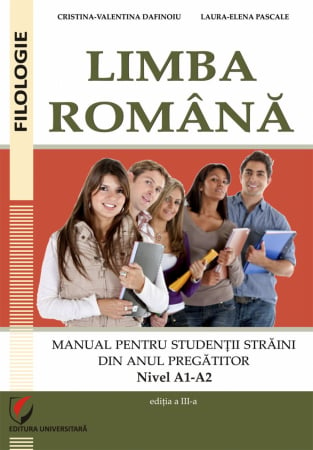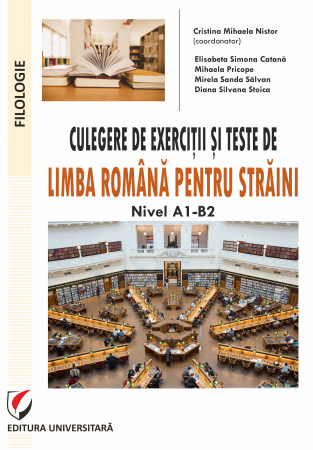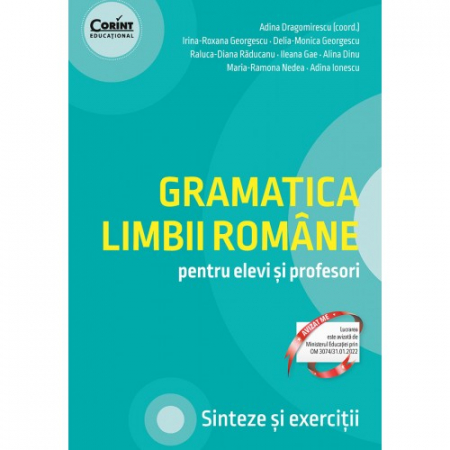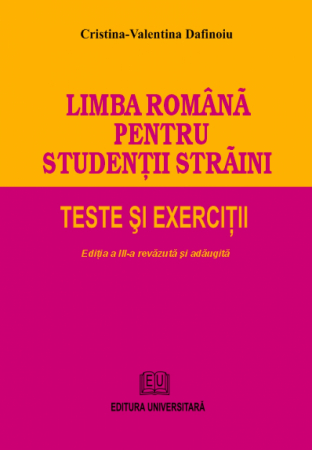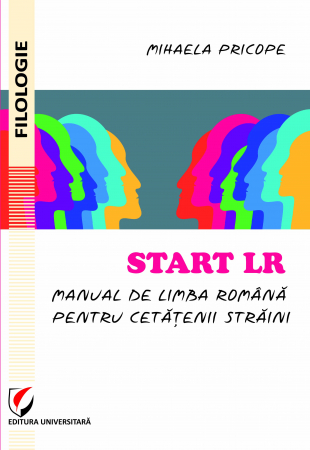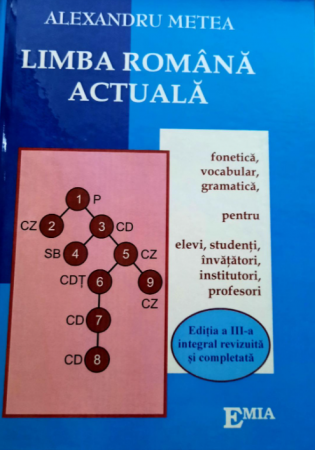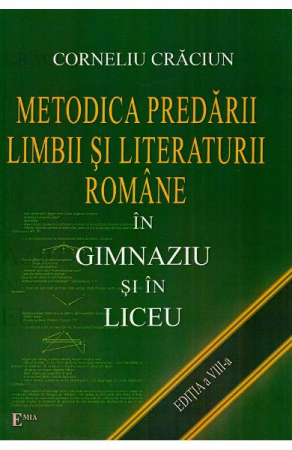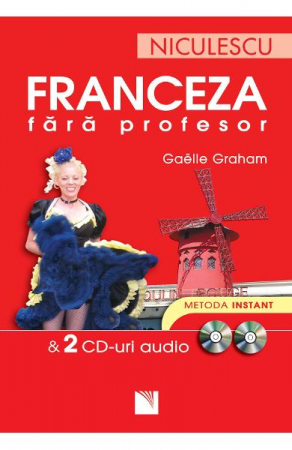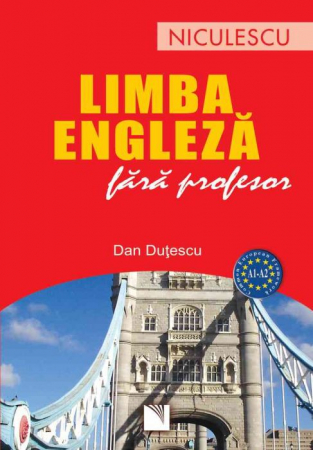ISBN: 978-606-591-619-7
DOI: 10.5682/9786065916197
Publisher year: 2013
Edition: I
Pages: 334
Publisher: Editura Universitara
Author: Maria-Luiza Dumitru-Oancea
- Description
- Download (1)
- Authors
- Content
- Reviews (0)
The present research aims to offer the public a generous applied study, a critical anthological monograph entitled simply Apollonius Rhodius. "Argonautics", in order to present the life and, especially, the work of the Alexandrian writer from a new perspective, of the reader less overwhelmed and discouraged by the clichés of traditional criticism, but rather paying attention to the details that provoke the adoption of a reading grid. meant to capture that unspeakable of Apollonian opera. For it is unlikely that we now consider Apollonius a clumsy writer, either because of his immature age or because of his desire not to go beyond the patterns set by Callimachus, his mentor, as his exegetes have hitherto done. older or newer. In our opinion, Apollonius of Rhodes is more than a fervent militant, enlisted in the army of writers who obstinately practiced the strategy imposed by the inventors of Alexandrian writing techniques: he himself can be considered in their ranks a neotter or inventor who manages to masterfully master the techniques of irony. fine, but also to put in a whole new light the image of epic and tragic patterns, succeeding, in the end, to melt them into a matter that he chose to be unexpectedly an epic one, but of a completely unusual type, tributary not only to archaic epics and classical ancient dramaturgy, but also to Romanian techniques. We would even say that, as we will see from the analysis contained in the following pages, Apollonius can be considered a poietés neóteros neotérōn therefore an innovator among innovators. It is perhaps the first time that an Alexandrian writer has used an entire ancient literary arsenal of genres and species to dismantle, not without fine irony, their shortcomings. For it was not the direct critical attitude that was the effective way, but rather the biting, disqualifying irony.
But, in order to be able to prove this thesis, but also another one regarding the poet's intention to socialize the heroic and legendary characters, as well as the oldest Greek institutions, we thought it appropriate to offer not only details about the life and work of the writer, about tradition the manuscript either about the legendary one that preceded the appearance of the famous Apollonian Argonauts, or even about the composition of the epic, but also a detailed analysis on the parody of the epic and tragic tópos. Another chapter, perhaps less expected, but still unique in the more comprehensive context of Apollonian exegesis, is entitled The Art of Discourse in the Argonauts of Apollonius Rhodius, which appeared and developed following a careful analysis of the dialogued passages or monologues spoken by protagonists. I also introduced, in addition to the other more extensive chapters, a short chapter entitled Homer and the Art of Apollonian Comparison. In short, out of the desire to make available to readers a sample of what we call Apollonius' infinite capacity for innovation, which, thus, will not only remain a mere imitator of the model, but will succeed in overcoming its inhibitory threshold. literary, which others even set out to copy.
At the end of our hermeneutic excursion we provided a generous support of passages (Capitula excerpta) chosen from the Argonautics, both in Greek, using the edition of GW Mooney (The Argonautica of Apollonius Rhodius, London-Dublin, 1912), as well as and in the Romanian translation belonging to Ion Acsan (Argonautics. The Epic of the Argonauts, Bucharest, 1976). The chosen passages have a suggestive title that facilitates their situation in the wider framework of the story. Also, the texts are accompanied by a broader critical presentation and explanatory notes that refer especially to the proper names of the characters, peoples and localities often strange or even unheard, so that we can come to support the index. ethnographic and geographical in Greek (Index graece ethnographicum et geographicum) at the end of our monograph. We also thought it appropriate to reproduce, in the footnotes, the main original texts that testify to the cramps in the life of the Alexandrian poet (Vita I, Vita II, lexicon Suda).
Regarding the transcription of Greek proper names, we took into account both the norms established in the introductory pages of the complete edition of Plato's work (coordinators: Petru Cretia and Constantin Noica, Scientific Publishing House, Bucharest, 1964-1993 ), as well as those established in the introduction of the European Mythical Toponymy dictionary made within the Geomitica scientific project (coordinator: Florica Bechet, consultant: Gabriela Cretia; authors: Ioana Costa, Doina Doroftei, Octavian Gordon, Simona Nicolae, Maria-Luiza Oancea, Bucharest , University of Bucharest Publishing House, 2010, pp. 13-15). I considered necessary the notation of the accented syllables with a sharp accent, and not with their original accent, only for the proper names transliterated from the Greek language and only in the exegetical passages, not in the translation of the passages from the Argonautics corpus. For proper nouns already in use with a certain transcription and pronunciation (e.g. Medea, Heracles, Aphrodite, Hera, Athena) I did not consider necessary the notation of the stressed syllable. We also opted for the transcription of Apollonius, and not Apollonios (the original version), as international usage generally prefers the Latin forms in -us for the names of people instead of the Greek forms in -os.
-
APPOLLONIUS RHODIUS (AΠΟΛΛΩΝΙΟΣ ΡΟΔΙΟΣ) ARGONAUTICELE
Download
MARIA-LUIZA DUMITRU-OANCEA
RESEARCH DIRECTIONS: Mythology, Cultural Anthropology, Didactics
UNIVERSITY STUDIES
Doctor in Philology, University of Bucharest, with the work Archetype of Death and of the Anthropophagous Monster in Latin Literature. Mythical-Folkloric parallels. Thesis supervisor: professor Dr. Eugen Cizek, 2004.
Master in Classical Philology, University of Bucharest, Faculty of Foreign Languages and Literatures with the work Wolf Cult, Skull Cult and Anthropophagy: Primitive Symbolism and Mythical and Folkloric Transformations. The leader of the paper: associate professor Dr. Gabriela Cretia, 1996.
Degree in Classical Philology, University of Bucharest, Faculty of Foreign Languages and Literatures. Archaic Religious Structures in Greek and Latin Literature and in Romanian Folklore. The leader of the paper: associate professor Dr. Gabriela Cretia. 1998-1995.
TEACHING ACTIVITY
niversity lecturer PhD, University of Bucharest, Faculty of Foreign Languages and Literatures (2005- present)
COURSES: Syntax of Ancient Greek Language, Civilization Course, Synchrony and Diacrony, Descriptive Morphology of Ancient Greek Language, Methodology.
PRACTICAL COURSES: Homer (Odysseia), Apollonios of Rhodes (Argonautika), Apollodoros (Bibliotheke), Vergilius (Aeneis), Plutarch (Vitae parallelae - Alexandros), Greco-Roman mythography (Homer, Hesiod, Apollodoros, Apollonius, Ovid) .).
SEMINARS: Greek Descriptive Morphology, Greek Syntax, Old Language (Greek and Latin), Old Source Language (Greek), Latin and Greek Methodology, Pedagogical Practice.
Assistant Professor, University of Bucharest, Faculty of Foreign Languages and Literatures. (2000-2005)
COURSES: Descriptive Morphology of the Ancient Greek Language, Latin and Ancient Greek Paleography.
PRACTICAL COURSES: Greco-Roman mythology (first year master), Plutarch (Vitae parallalelae - Alexandros; De Iside Osiride), Plato (Protagoras).
SEMINARS: Descriptive Morphology of the Ancient Greek Language, Syntax of the sentence of the ancient Greek language, Greek-Latin Methodology, Old Profile Language - Faculty of Letters and Faculty of Foreign Languages and Literatures, Romance Languages - (Ancient Greek Language and Latin Language), Ancient Language of spring - history faculty - (Ancient Greek Language).
Teaching practice
Full Professor, ORTHODOX HIGH SCHOOL THEOLOGICAL SEMINAR, Bucharest (1995-2000)
TEACHING COURSES: Greek and Latin
TEACHING FUNCTIONS
Member of the Commission to be finalized (2010-2012).
Member of the Admission Commission for the bachelor's degree (2010-2011).
Member of the Bachelor's Dissertation Support Committee (2010-2012). Member of the Licensing Examination Board (2010-2012).
Member of the Commission for taking the second degree exams - thesis correction - (2012).
Member of the Enrollment Commission for the master's degree organized by the Faculty of Foreign Languages and Literatures in Bucharest (2011-2012).
Member of the Promotion Commissions for the preparatory degree (Simona Georgescu) and for the lecturer degree (Theodor Georgescu, Tudor Dinu, Cezar Tabarcea, Simona Nicolae), Faculty of Foreign Languages and Literatures, University of Bucharest (2007-2008).
Dean of the Year, Faculty of Foreign Languages and Literatures, University of Bucharest (2005-present).
Member of the Bachelor's Committee (2010-2011), Faculty of Foreign Languages and Literatures, University of Bucharest (subject, proofreading, coordination of bachelor's theses, supervision of candidates).
Member of the Definitive Commission (2010-2011), Faculty of Foreign Languages and Literatures, University of Bucharest (subject, proofreading, supervision of candidates).
Member of the Central Commission for Admission and Pre-Admission to the Faculty of Foreign Languages and Literatures and to the Faculty of Letters, University of Bucharest (2000, 2004-2006, 2011: receipt of registration files, supervision of candidates, proofreading).
Member of the National Commission for Curriculum, Working Group for Ancient Greek. MINISTRY OF EDUCATION AND RESEARCH (2000, 2001, 2004-2006).
Member of the National Commission for the elaboration of analytical programs for the preparation of didactic degrees Definitivat, Degree II and Degree I, MINISTRY OF EDUCATION AND RESEARCH. Poiana Pinului, 2001.
Member of the Organizing Committee of the Classical Languages Olympiad, National Phase, MINISTRY OF EDUCATION AND RESEARCH (2002).
Preparatory professor of the Romanian Olympic Team participating in the International Phase of the Classical Languages Olympiad (Certamen Ciceronianum Arpinas), UNIVERSITY OF BUCHAREST, MINISTRY OF EDUCATION AND RESEARCH. BuSteni (2000).
Member of the Organizing Commission of the Classical Languages Olympiad, County Phase, SCHOOL INSPECTORATE OF BUCHAREST (1995-2001).
Methodist Professor for Ancient Greek Language, SCHOOL INSPECTORATE OF BUCHAREST (1999).
ORGANIZATION OF CONGRESSES AND CONFERENCES
Member of the Organizing Committee of the International Colloquium Expressions of Fear from Antiquity to the Contemporary World, Bucharest, March 29-30, 2013, organized under the patronage of the Society of Classical Studies in Romania and the Institute of Classical Studies of the University of Bucharest.
Member of the organizing committee of the International Classical Romanian-Dacian Conference, Bucharest - Constanta, September 25-29, 2008, chaired by Prof. Dr. Eugen Cizek and Prof. Dr. Gabriela Cretia and organized under the auspices of the Society for Classical Studies in Romania.
Member of the organizing committee of the International Euroclassical Session, Bucharest, September 2008, chaired by Prof. Dr. Eugen Cizek and Prof. Dr. Gabriela Cretia and organized under the auspices of the Romanian Society for Classical Studies.
Member of the Organizing Committee of the Locus International Colloquium in Fable Places, Names, Myths, Bucharest, September 27-28, 2010, organized under the patronage of the Society for Classical Studies in Romania and the Institute of Classical Studies of the University of Bucharest.
ATTRACTING AND DISSEMINATING STUDENTS
Bachelor thesis supervisor (2010-2012)
Student counseling.
Writing recommendations for deserving students in order to obtain international scholarships (Portugal, University of Coimbra, 2011, bachelor module, Stoian Isabela student; France, University of Lyon, 2010, doctoral module, Dr. Andreea Stefan, etc.).
ADMINISTRATIVE ACTIVITIES AND FUNCTIONS
Vice-President, SOCIETATEA HUMANITAS CHRISTIANA, Bucharest, (2000-present).
Treasurer, ROMANIAN SOCIETY OF CLASSICAL STUDIES (2002-present).
Treasurer, Department of Classical Philology, UNIVERSITY OF BUCHAREST (2000-present).
Secretary of the Office of the Department of Classical Philology, UNIVERSITY OF BUCHAREST (2004-present).
Representative of the Department of Classical Philology at the Education Fair, University of Bucharest (2006-2007, 2008, 2010-2012).
Representative of the Department of Classical Philology at Open Doors, University of Bucharest (2006-2007, 2008, 2010-2012).
AWARDS AND DISTINCTIONS
ARISTARH Prize of the ROMANIAN SOCIETY OF CLASSICAL STUDIES for the Memory of Deep Studies Wolf Cult, Skull Cult and Anthropophagy: Primitive Symbolism and Mythical and Folkloric Transformations, 1996.
SCIENTIFIC AFFILIATES
Member of UNIVERSITY SOLIDARITY, UNIVERSITY OF BUCHAREST (2002-present).
Member of the ROMANIAN SOCIETY OF CLASSICAL STUDIES (1996-present).
FOREIGN LANGUAGES
French and English.
PRESENTATIONS AT CONFERENCES AND MEETINGS
▪ “Mocking Epic and Tragic Patterns in Apollonius of Rhodes’ Argonautica ”, 5th Annual International Conference on Literature, Languages and Linguistics, Athens, Greece, July 9-12, 2012, Athens Institute for Education and Research.
▪ "Suspension Rhetoric in the Argonauts of Apollonius of Rhodes", International Colloquium Reception of Greco-Latin Antiquity in European Cultures. Under the sign of Hermes. 5th Edition, May 11-12, 2012, University of Craiova, Faculty of Letters, Romanian Society of Classical Studies - Craiova Branch.
▪ "The ironization of epic and tragic patterns in the Argonauts of Apollonius of Rhodes", Lupus Colloquium in the fable. Places, names, myths, Bucharest, September 27-28, 2010, organized under the patronage of the Romanian Society of Classical Studies and the Institute of Classical Studies of the University of Bucharest.
▪ "Antiospetia in Homeric Odyssey", meeting of the ROMANIAN SOCIETY OF CLASSICAL STUDIES, Bucharest, December, 2009.
▪ "Techniques for mystifying the Sacred in the mythological literature of ancient Greece", International Colloquium LATINITY - ROMANITY - ROMANITY, 7th Edition, Section "Cultural Dialogue in Europe", Targoviste, session 9-11 May 2008.
▪ Methodology course: Macro-design of a project that characterizes the end of a learning unit; Trans perspective design: building the integrated option; Theme proposals for the Integrated Optional: From the world gathered; Greek and Latin writers in whose works references to our country are attested; The woman in Latin literature, presented within the CCD grant on Latin Language Methodology, October 2007-January 2008 session.
▪ "Phileo and Agapao: man's love and God's love in the Romanian versions of the Bible", International Colloquium RECEPTION OF GREEK-LATIN ANTIQUITY IN EUROPEAN CULTURES, CULTURE, HISTORY AND CIVILIZATION section, November 23, 2007, Faculty of Letters, Department of Lingv Classical Languages - Romanian Society of Classical Studies, Craiova Branch
▪ "The laws of hospitality in the Greco-Roman world", International Colloquium LATINITY - ROMANITY - ROMANITY, 6th edition, Targoviste, May 11-13, 2007, "Wallachia" University.
▪ “The myth of Polyphemus. The game of manipulation and mutual ignorance ”, International Symposium EUROPEAN CIVILIZATION - UNITY, UNITY, OPENING - II, OCTOBER 3 - 8, 2006, Romanian Writers' Union," Mircea Dinescu "Poetry Foundation, East - West Cultural Foundation.
▪ “Thanatos, male representation of death in archaic Greece”, International Symposium: Ethnic contacts and Cultural Exchanges North and West of the Black Sea, June 12 - 17, 2005, Ancient History and Archeology section, Romanian Academy - Iasi Branch, Institute of Archeology, Institute of History "AD Xenopol".
▪ „Ancient mythological patterns and modern representations. Ielele in Romanian literary folklore ”, section Mentalities - Comparative Mythology., International Colloquium LATINITY - ROMANITY - ROMANITY, 4th edition, Targoviste, May 6 - 8, 2005," Valahia "University.
▪ “Founding Sacrifice in Archaic Rome”, meeting of the ROMANIAN SOCIETY OF CLASSICAL STUDIES, Bucharest, March, 2004.
▪ “Speculations on the mystical connection between Numa Pompilius and the Camenae Nymphs”, Timpul, Timpurile Colloquium, of the Faculty of Foreign Languages and Literatures, UNIVERSITY OF BUCHAREST, 2000.
▪ “Archaic Religious Structures in the Fantastic Fairy Tale The Story of Harap-Alb”, Literature Circle of the Department of Classical Philology, UNIVERSITY OF BUCHAREST, 1997.
GRANTS
1. Member of the research project PN-II-ID-PCE-2007-1, exploratory research project funded by CNCS, entitled: EUROPEAN MYTHICAL TOPONYMY. GLOSSARY AND INTERACTIVE DATABASE FOR THE STUDY OF TOPONYMS WITH MYTHOLOGICAL RELEVANCE FROM THE GREEK-LATIN SPACE, director: prof. Univ. Dr. Florica Bechet (2007-2011).
2. Member within the academic project of Translation of the works of the Holy Fathers, initiated and financed by the Romanian Patriarchate, with the work Saint Jerome - "Letters" (2010-2011).
3. Member within the grant initiated by CCD regarding the Latin Language Methodology, session October 2007- January 2008.
ARGUMENT / 11
1. APOLLONIUS RHODIUS. LIFE AND OPERATION / 15
1.1. Biography and approximate dating of the publication of the Argonautics epic / 15
1.2. Hypotheses regarding the approximate date of publication of Argonautics / 20
1.3. Other works attributed to Apollonius of Rhodes / 21
1.4. A conflict between master and disciple? / 22
2. ARGONAUTICS / 26
2.a. Handwritten tradition. Pleading for house / 26
2.b. Editions, comments and manuscripts of the Apollonian text from antiquity to the medieval period / 28
2.b.1. Ancient Manuscripts of the Apollonian Text / 28
2.b.2. Editions established by philologists and taken over by compilers / 29
2.b.3. The three medieval manuscripts of the Apollonian text (w, k, m) according to H. Fränkel's first classification / 30
2.b.4. "Contaminated" editions / 34
2.b.5. Copies due to Demétrios Móschos / 34
2.b.6. A new classification of manuscripts proposed by H. Fränkel / 35
2.b.7. Tribute editions of Maximus Planudes' school / 36
2.b.8. The connection between Protocretensis and the planudean group / 37
2.b.9. The lessons kept by Demétrios Móschos / 38
2.c. „Argonautica” before Argonautica / 39
2.c.1. Prehomeric / 39
2.C.2. Hesiodicá / 41
2.c.3. Naupáctia / 42
2.c.4. Corinthians / 43
2.c.5. The reason for the death of King Pelias in Greek literature / 45
2.c.6. Pindaric version / 47
2.c.7. Greek literature of the 5th-4th centuries BC / 48
2.c.8. The importance of the Argonauts' legend for logographers and historians / 50
2.c.9. Valorization of the reason for the expedition of the Argonauts in the pre-Apollonian Greek literature and in the contemporary one of Apollonius / 50
2.c.10. Plastic representations of the myth of the Argonauts in the archaic period / 52
2.d. The composition of Argonautics (structure; language and style) / 53
2.E Argonautics, humanization of the marks of the epic and dramaturgy / 57
2.F. The art of discourse in the Argonauts of Apollonius Rhodius / 83
2.f.1. Prophetic Discourses / 86
2.f.2. Heroic speeches / 89
2.f.3. The divine discourse / 93
2.f.4. Erotic discourse / 97
2.f.5. Hospitality speech / 101
2.f.6. Conclusions / 119
2.g. Homer and the art of Apollonian comparison. Brief / 123
2.E Closing / 131
3. EXCERPTA CHAPTER, accompanied by the commented presentation of the songs and notes / 135
3.1. Cantul I / 136
3.1.1. Preamble / 136
3.1.2. Who were the Argonauts (I, vv. 1-22; 228-255) / 141
3.1.3. Jason and the Argonauts reach the island of Lemnos (I, vv. 605-914). 146 3.1.4. The Argonauts are hosted by King Kýzicos; Jason kills his host recklessly (I, vv. 947-1069) / 163
3.2. Cantul II / 171
3.2.1. Preamble / 171
3.2.2. The Argonauts reach the prophet Phineus; his prophecies concerning their expedition (II, vv. 178-497) / 179
3.2.3. The passage of the Argonauts among the rocks of Symplegáde (II, vv. 549-618) / 197
3.2.4. The Argonauts reach the island of Ares, Aretiás (II, vv. 1046-1089) / 203
3.2.5. Meeting of Jason and the Argonauts with the sons of Phryxos on the island of Ares, Aretiás (II, vv. 1093-1167) / 206
3.3. Cantul III / 212
3.3.1.Preamble
3.3.2. Hera and Athena visit Aphrodite; Eros arrows Medea to fall in love with Jason (III, vv. 1-166; 275-298) / 219
3.3.3. Iáson, accompanied by the sons of Phríxos, arrives at the palace of King Aiétes (III, vv. 299-421) / 230
3.3.4. The erotic tribulations of Medea (III, vv. 770-821) / 239
3.3.5. Medea reaps the magic wrath (III, vv. 828-886) / 243
3.3.6. Medea gives Jason the magic spell (III, vv. 948-1101) / 248
3.4. Song IV / 259
3.4.1. Preamble / 259
3.4.2. Jason, aided by Medea, steals golden wool (IV, vv. 109-182) / 269
3.4.3. Medea seduces her brother, Apsyrtus, and Jason kills him (IV, vv. 410-480 / 275
3.4.4. Jason and Medea visit the witch Circe to be cleansed of crime (IV, vv. 659-752) / 280
3.4.5. Jason's Wedding to Medea in the Land of the Peacocks (IV, vv. 1128-1169) / 286
4. GRAECA EXCERPTA / 290
5. GENERAL BIBLIOGRAPHY / 326
6. INDEX GRAECE ETHNOGRAPHICUM AND GEOGRAPHICUM / 332
Customer Support Monday - Friday, between 8.00 - 16.00
0745 200 718 0745 200 357 comenzi@editurauniversitara.ro
6359.png)
![Appollonius Rhodius (AΠΟΛΛΩΝΙΟΣ ΡΟΔΙΟΣ). Argonautics [1] Appollonius Rhodius (AΠΟΛΛΩΝΙΟΣ ΡΟΔΙΟΣ). Argonautics [1]](https://gomagcdn.ro/domains/editurauniversitara.ro/files/product/large/appollonius-rhodius-a--argonauticele-1446-257692.jpg)
